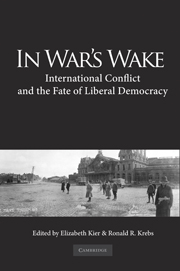Book contents
- Frontmatter
- Contents
- List of Contributors
- Acknowledgments
- 1 Introduction
- PART I WAR AND DEMOCRATIC TRANSITIONS: NEW AND DURABLE DEMOCRACIES?
- PART II WAR AND DEMOCRATIC PUBLICS: RESHAPING POLITICAL PARTICIPATION?
- 5 The Effects of War on Civil Society
- 6 Veterans, Human Rights, and the Transformation of European Democracy
- 7 War and Reform
- 8 Spinning Mars
- PART III WAR AND DEMOCRATIC STATES: GOVERNMENT BY THE PEOPLE OR OVER THE PEOPLE?
- References
- Index
8 - Spinning Mars
Democracy in Britain and the United States and the Economic Lessons of War
Published online by Cambridge University Press: 05 June 2012
- Frontmatter
- Contents
- List of Contributors
- Acknowledgments
- 1 Introduction
- PART I WAR AND DEMOCRATIC TRANSITIONS: NEW AND DURABLE DEMOCRACIES?
- PART II WAR AND DEMOCRATIC PUBLICS: RESHAPING POLITICAL PARTICIPATION?
- 5 The Effects of War on Civil Society
- 6 Veterans, Human Rights, and the Transformation of European Democracy
- 7 War and Reform
- 8 Spinning Mars
- PART III WAR AND DEMOCRATIC STATES: GOVERNMENT BY THE PEOPLE OR OVER THE PEOPLE?
- References
- Index
Summary
The largest wars of the modern era, which involved huge mobilizations of entire national economies as well as manpower, are often understood as having promoted social solidarity and a broader role for the state in guaranteeing welfare and economic equality. This view flourished in Britain in the 1950s, when social scientists, including Richard Titmuss and T. H. Marshall, suggested that the experience of all-out war promoted a sense of social interdependence that encouraged the expansion of citizenship and the welfare state. Although this understanding of the political consequences of war may no longer seem as compelling as it was a half-century ago, much of it is still accepted by historians of modern Europe. Although more recent wars do not seem to have done as much to promote social democracy, this would not have surprised Titmuss and Marshall, since these have been more limited conflicts. We need to be careful, however, about assuming a direct relationship between the intensity of mobilization and the depth of social-democratic reform. To understand why, we need look no further than an important comparative case: Britain and the United States during and after World War II.
While mobilization for all-out war seems to have served as a catalyst for major social-democratic reforms in Britain and elsewhere, it did not have this effect in America. In the months and years after World War II, the United States saw little of the extension of universal social welfare provisions and the nationalization of large pieces of the economy that occurred across the Atlantic.
- Type
- Chapter
- Information
- In War’s WakeInternational Conflict and the Fate of Liberal Democracy, pp. 162 - 184Publisher: Cambridge University PressPrint publication year: 2010



